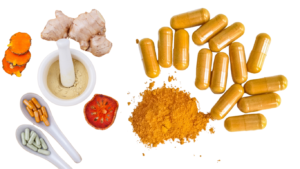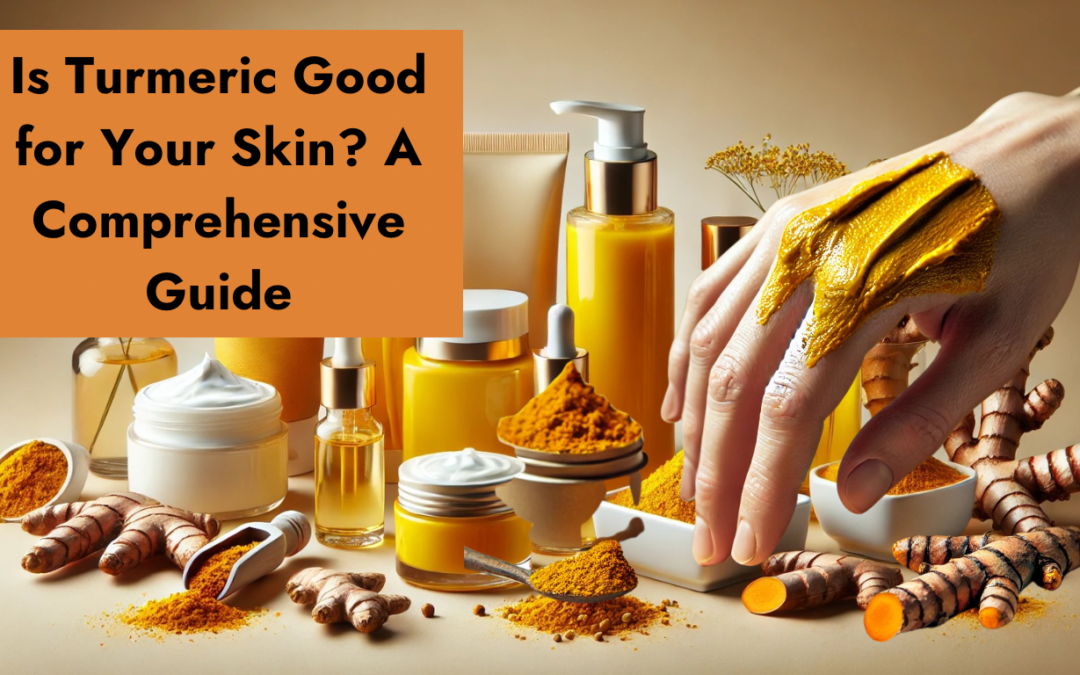Turmeric, the golden-yellow spice derived from the root of Curcuma longa, has been a cornerstone of traditional medicine for centuries, especially in Indian Ayurvedic and Chinese medicine. It is celebrated not only for its culinary uses but also for its numerous health benefits.
When it comes to skincare, turmeric has gained global attention as a natural remedy for various skin conditions and as a beauty-enhancing ingredient.
But is turmeric genuinely good for your skin, or is it just another beauty fad?
Let’s learn about benefits and practical applications of turmeric for skincare.
What Makes Turmeric Special for Skin?
The secret to turmeric’s skincare benefits lies in its active ingredient, curcumin. Curcumin is a bioactive compound known for its powerful anti-inflammatory, antioxidant, and antimicrobial properties.
It helps combat free radicals, reduces inflammation, and soothes the skin, making it a valuable ingredient in both home remedies and commercial skincare products.
Here’s what curcumin does:
- Anti-Inflammatory Properties: Turmeric helps reduce redness, swelling, and irritation, making it effective against conditions like acne, eczema, and rosacea.
- Antioxidant Power: It fights oxidative stress caused by pollution and UV radiation, preventing premature aging.
- Antimicrobial Effects: Turmeric can combat bacteria and fungi, helping to reduce acne and other skin infections.
- Skin Brightening: Regular use of turmeric can lighten hyperpigmentation and even out skin tone.
Related Read: What makes Curcumin the Active Powerhouse in Turmeric
The Skin Benefits of Turmeric
1. Reduces Acne and Acne Scars

Acne is often caused by clogged pores, bacteria, and excess oil production. Turmeric’s antimicrobial and anti-inflammatory properties can help address these issues. When used consistently, it not only reduces active acne but also minimizes the appearance of scars left behind.
How It Works:
- Curcumin controls the bacteria responsible for acne (Propionibacterium acnes).
- It reduces inflammation in the skin, preventing further breakouts.
Best Uses:
- Mix turmeric powder with honey to create an anti-acne face mask.
- Apply a turmeric-infused spot treatment on stubborn pimples.
2. Evens Skin Tone and Reduces Hyperpigmentation

Turmeric is a natural remedy for uneven skin tone caused by sun damage, melasma, or post-inflammatory hyperpigmentation. Its skin-lightening properties help fade dark spots over time.
How It Works:
- Curcumin inhibits the production of melanin, the pigment responsible for dark spots.
- It encourages cell turnover, revealing brighter skin.
Best Uses:
- Combine turmeric with yogurt or milk to make a brightening mask.
- Use turmeric-infused oils or serums available in the market.
3. Fights Premature Aging

Fine lines, wrinkles, and sagging skin are often caused by oxidative stress. Turmeric’s antioxidant properties neutralize free radicals, promoting youthful and radiant skin.
How It Works:
- Curcumin stimulates collagen production, improving skin elasticity.
- It protects skin from environmental damage like UV rays and pollution.
Best Uses:
- Mix turmeric with aloe vera gel for a soothing anti-aging mask.
- Include turmeric in your diet for systemic anti-aging benefits.
4. Soothes Eczema and Psoriasis

Chronic skin conditions like eczema and psoriasis cause redness, itching, and inflammation. Turmeric can alleviate these symptoms when applied topically or consumed orally.
How It Works:
- Its anti-inflammatory properties calm irritated skin.
- Turmeric reduces flare-ups and accelerates healing.
Best Uses:
- Apply turmeric paste mixed with coconut oil on affected areas.
- Drink turmeric tea to reduce inflammation from within.
5. Boosts Wound Healing

Turmeric has been used for centuries to heal cuts, burns, and wounds. Its antimicrobial and anti-inflammatory properties speed up the healing process and reduce the risk of infection.
How It Works:
- Curcumin promotes the production of natural growth factors in the skin.
- It minimizes scarring by regulating inflammation.
Best Uses:
- Apply a paste of turmeric and water directly on minor wounds.
- Use turmeric-infused balms for everyday skin injuries.
Related Read: What are the Benefits of Using Turmeric in Beauty Products
How to Use Turmeric for Skin
Turmeric can be incorporated into your skincare routine in various ways:
1. DIY Face Masks

One of the easiest ways to use turmeric is by making face masks at home. Here are some tried-and-tested recipes:
Turmeric and Honey Mask
- 1 teaspoon turmeric powder
- 1 tablespoon raw honey
- Mix into a smooth paste and apply for 15-20 minutes. Rinse with lukewarm water.
Benefits: Anti-acne, brightening, and hydrating.
Turmeric and Yogurt Mask
- 1 teaspoon turmeric powder
- 2 tablespoons plain yogurt
- Mix and apply for 10-15 minutes. Rinse with cold water.
Benefits: Exfoliating, soothing, and brightening.
Turmeric and Aloe Vera Mask
- 1 teaspoon turmeric powder
- 2 tablespoons aloe vera gel
- Apply for 20 minutes before rinsing off.
Benefits: Anti-inflammatory and anti-aging.
2. Turmeric in Skincare Products

If DIY isn’t your thing, look for skincare products infused with turmeric. These may include:
- Turmeric creams
- Face serums
- Body lotions
- Cleansers and toners
Ensure the product contains a significant amount of turmeric or curcumin extract to reap its benefits.
3. Turmeric Supplements

Taking turmeric supplements orally can enhance your skin health from the inside out. Curcumin capsules are widely available and often combined with black pepper extract (piperine) to improve absorption.
Potential Side Effects and Precautions
While turmeric is generally safe, it’s essential to use it correctly to avoid potential side effects:
- Staining: Turmeric can leave a yellow stain on the skin. Mix it with ingredients like yogurt or oil to reduce staining.
- Allergic Reactions: Perform a patch test before applying turmeric to your face. Some people may develop irritation or redness.
- Overuse: Excessive use of turmeric can dry out the skin. Limit its application to 2-3 times per week.
- Quality Matters: Use organic turmeric powder free from additives or artificial colors.
Incorporating Turmeric into Your Diet for Skin Health
Topical application isn’t the only way to enjoy turmeric’s benefits. Consuming turmeric can improve overall skin health by reducing inflammation and oxidative stress in the body.
Here’s how you can add turmeric to your diet:
- Golden Milk: Mix turmeric powder with warm milk and honey for a soothing bedtime drink.
- Smoothies: Add a pinch of turmeric to your morning smoothie for an antioxidant boost.
- Turmeric Tea: Brew turmeric with ginger and black pepper for a detoxifying tea.
- Curry Dishes: Include turmeric in your cooking for both flavor and health benefits.
Scientific Studies on Turmeric for Skin
Research supports many of turmeric’s skincare claims:
- A 2016 study published in the Journal of Medicinal Food found that turmeric extracts significantly improved skin tone and reduced fine lines.
- Another study in the Phytotherapy Research Journal highlighted turmeric’s anti-inflammatory effects in treating psoriasis.
- A 2019 review emphasized turmeric’s role in reducing oxidative damage and protecting against photoaging.
While more clinical trials are needed, the existing evidence strongly supports turmeric as a valuable skincare ingredient.
Final Thoughts
So, is turmeric good for your skin? The answer is a resounding yes! With its anti-inflammatory, antioxidant, and antimicrobial properties, turmeric is a versatile and effective remedy for numerous skin concerns. Whether you’re battling acne, looking to brighten your complexion, or seeking natural anti-aging solutions, turmeric can be a powerful addition to your skincare routine.
However, like any ingredient, it’s essential to use turmeric mindfully and in moderation. Combine it with other nourishing ingredients, patch-test before use, and incorporate it into your diet for optimal results. Embrace the golden glow of turmeric and let your skin reap the benefits of this time-tested remedy.
Disclaimer: This article is for informational purposes only and does not constitute medical advice. Consult a dermatologist before trying new skincare treatments.

